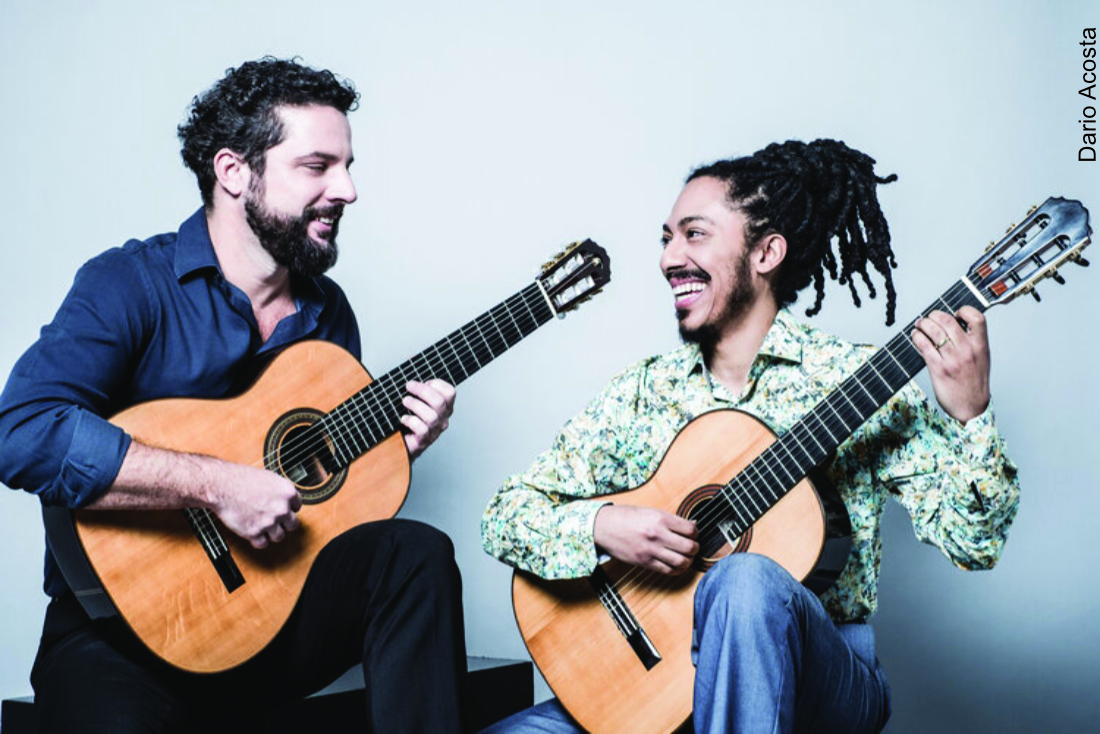The Brasil Guitar Duo is hailed by Classical Guitar magazine for its “maturity of musicianship and technical virtuosity.” Douglas Lora and João Luiz met in São Paulo as teenage guitar students and their successful partnership of over twenty years is the result of their innovative programming.
The duo actively strives to expand the repertoire for two guitars, with Lora contributing works of his own and Luiz arranging both classical and Brazilian music. Appearing frequently in diverse non-traditional spaces, the duo combines classical guitar repertoire with traditional Brazilian dance forms.
This will be their first appearance in our series.
Astor Piazzolla (1921 – 1992)
Zita*
Fred Hand (b. 1947)
Still
Egberto Gismonti (b. 1947)
Frevo*
A Fala da Paixão*
Alegrinho n.2*
Karatê*
Intermission
Leo Brouwer (b.1939)
Sonata de los Viajeros
1. Primer viaje a Tierras Heladas
2. El Retablo de las Maravillas – La Venus de Praxíteles
3. Visita a Bach en Leipzig
4. Por el Mar de las Antillas
Zequinha de Abreu (1880-1935)
Tico-tico no Fubá
Jacob do Bandolim (1918 -1969)
Doce de Coco
Hermeto Pascoal (b. 1936)
Bebê
*arranged by João Luiz
Zita* Astor Piazzolla (1921 – 1992)
Astor Piazzolla is an Argentine accordionist, composer, and arranger. He is best known for developing a style of music called New Tango. Piazzolla brought this folk musical style into the concert hall and blended it with modernist classical and jazz techniques. In Argentina Piazzolla studied under the composer Alberto Ginastera. He later moved to Paris where he studied under the famous music pedagogue Nadia Boulanger, alongside composers like Aaron Copland and Virgil Thomson.
Zita is the second movement of his Suite Troileana, a cycle of pieces composed in 1975 and dedicated to the memory of another famous Argentine bandoneon performer, Anibal Troilo. Piazzola had joined Troilo’s orchestra in 1939. Each movement of the piece is inspired by one of Troilo’s great passions, and Zita is the name of his wife. The other movements are titled I. Bandoneon, III. Whiskey, and IV. scholastic.
Still Frederic Hand (b. 1947)
Frederic Hand is an American guitarist and lutenist in the New York Metropolitan Opera. He studied at the Mannes School of Music and later in England under the classical guitarist Julian Bream. A Grammy nominee for his composition Prayer, Hand has worked with renowned musician Luciano Pavarotti, and his film scores have been found on the silver screen, most notably Sesame Street. In addition to his performance ventures, he has also served as the chair of the classical guitar departments at Bennington College and SUNY Purchase.
Still begins with a short figuration which the two guitarists trade between one another. Short melodic ideas are often interrupted with moments of silence, allowing the music to resonate before pressing on. Though Hand does not shy away from harmonically tense intervals, the character is gentle and serene throughout. This pensive work demonstrates the composer’s mature, well-developed compositional voice.
Frevo* Egberto Gismonti (b. 1947)
A Fala da paixão*
Alegrinho n.2*
Karatê*
Egberto Gismonti is a Brazilian composer, guitarist, and pianist. Born into a musical family, Gismonti began his piano studies at the age of six at the Brazilian Conservatory of Music in Rio de Janeiro, where he was a pupil for 15 years. Like Piazzola, Gismonti studied in Paris under Nadia Boulanger, who encouraged him to communicate the Brazilian experience through his music. Gismonti is self-taught at the guitar and a prolific composer for the instrument. After returning to Brazil, he spent time designing and composing for guitars with more than six strings.
Frevo was released in 1980 and is an homage to the great Paco de Lucia, one of the most famous Andalusian guitarists of the 20th century. A Fala da paixão, or “the speech of passion,” comes from Gismonti’s album Infancia, recorded in Oslo, Norway in 1990. This piece was originally composed for solo piano. The title for Allegrinho n. 2 is indicative of his musical voice, a classical tempo marking like “allegretto,” but translated into Portuguese. Karatê was originally composed for a large ensemble including bandoneon, flute, piano, and drum set.
INTERMISSION
Sonata de los viajeros Leo Brouwer (b. 1939)
- Primer viaje a tierras Heladas.
- El Retablo de las maravillas – la venus de Praxíteles
- Visita a Bach en Leipzig
- Por el mar de las Antillas
Leo Brouwer is a Cuban composer, conductor, and guitarist. He comes from a musical family as the grandson of the Cuban composer Ernestina Lecuona y Casado. His second cousin, Margarita Lecuona, composed the song “Babalú,” which was made famous by Desi Arnez. While growing up in Gavana, Brouwer studied under Isaac Nicola, leaving only three degrees of separation between him and the famous Spanish guitarist Francisco Tarrega. He went on to study under Vincent Persichetti at Juilliard. Brouwer worked alongside Morton Feldman in Germany during the 1970s, but his career was tragically cut short due to an injury to a tendon in the middle finger of his right hand.
The title of this work translates to “The Traveler’s Sonata.” The first movement is meant to represent the “frozen lands” found in the highest parts of the Andes Mountains. The second movement is inspired by the sculpture of Aphrodite (Venus), completed by the Greek sculptor Praxiteles. Brouwer describes this sculpture as the “altarpiece of the wonders.” The third movement tells the story of a visit to Bach in Leipzig, and is full of quotations of Baroque melodies. In the final movement, the listener is transported to the sea of Antilles. This music is relatively conventional and tonal for a piece of 21st century classical music.
Tico-tico no Fubá Zequinha de Abreu (1880-1935)
José Gomes de Abreu, also known as Zaquinha de Abreu, was a composer and wind instrumentalist from Brazil. Abreu played the flute and clarinet but was best known as a composer of Brazilian choro music. This popular music form was extremely popular in Brazil during the 20th century. His mother wanted him to become a priest, and he ended up studying harmony while attending the São Paolo Seminary at the age of 17. After founding his wind orchestra to accompany weddings, dances, and silent films, he wrote his most famous work in 1917, Tico-tico no Fubá.
This choro song was popularized in the 1940s by the singer Carmen Miranda in the United States. It became one of the most recorded songs in the world at the time. The song has appeared in no fewer than six Hollywood films. The Brazilian synchronized swimming team performed to this piece in the 2013 Olympics in Barcelona. The song title refers to a sparrow stuck in cornmeal.
Doce de Coco Jacob do Bandolim (b. 1918 -1969)
Jacob De Bandolim was born Jacob Pick Bittencourt in Rio de Janeiro in 1918. He was a prolific composer of Brazilian choro music. His stage name means “Mandolin Jacob,” which was his principal instrument. De Bandolim wished to combat the stereotype of the disheveled, drunk folk musician, so he always required his band members to be impeccably dressed and to keep a day job.
Doce de Coca is a lyrical piece that roughly translates to “Coconut Candy,” meant here as a term of endearment, like “Sweetheart.” The song is upbeat and romantic, with rhythms designed to keep listeners dancing through the night. For popular music, the piece uses relatively unsettled harmonies while maintaining a calm, easy-going character. Originally conceived as a purely instrumental work, it does include lyrics written by Herminio Bello De Carvalho.
Bebê Hermeto Pascoal (b.1936)
Hermeto Pascoal is a Brazilian composer and multi-instrumentalist. He grew up studying accordion indoors with his father for hours, as he is albino and could not work in the fields with the rest of his family. In addition to the accordion, Pascoal performs on the keyboard, flute, saxophone, and guitar. Pascoal first gained recognition for his work on Miles Davis’s Live-Evil. The famous trumpeter is said to have described him as “the most impressive musician in the world.” Pascoal then went on to win a Latin Grammy and became known as “o Bruxo” or “The Sorcerer” for his use of everyday objects like children’s toys and teapots in his music.
Bebê was originally written for large ensemble with Pascoal performing flute and piano on the track. He seamlessly combined electronic synthesizers and jazz figurations with traditional Brazilian popular dance rhythms. The flute melody from this piece was later quoted by the Brazilian heavy metal group Angra on the song Carolina IV from their second album, Holy Land.
*arranged by João Luiz
Brasil Guitar Duo
The Brasil Guitar Duo, hailed by Classical Guitar magazine for its “maturity of musicianship and technical virtuosity,” is equally at home on a classical or a world-music series or performing a concerto with orchestra. João Luiz and Douglas Lora met in São Paulo as teenage guitar students and their successful partnership of over twenty years results from their innovative programming—which features a seamless blend of traditional and Brazilian works—leading to a busy global touring schedule and a growing catalogue of critically acclaimed recordings garnering two Latin Grammy nominations.
Committed to performing new chamber music employing the guitar, the Duo joined cellists Yo-Yo Ma and Carlos Prieto for the October 2014 world premiere of El arco y la lira, a work for two cellos and two guitars by the esteemed Cuban composer Leo Brouwer. On the same program—a highlight of the sixth annual Festival Leo Brouwer in Havana—the Duo gave the Cuban premiere of Brouwer’s Sonata de Los Viajeros, which they had presented in its U.S. premiere the previous month and recorded for a Naxos CD of Brouwer’s complete works for two guitars, which was nominated for a 2016 Latin Grammy award for Best New Composition.
Eager advocates for new concerti for two guitars and orchestra, the Duo premiered Concerto for Two Guitars and Orchestra by Brazilian composer Paulo Bellinati with the São Paulo Symphony Orchestra in June 2012, under the direction of Giancarlo Guerrero, and gave the work its U.S. premiere in April 2013. In February 2016, they recorded the Bellinati concerto along with Leo Brouwer’s concerto Book of Signs with the Delaware Symphony Orchestra and conductor David Amado.
The Duo’s principal teacher was Henrique Pinto, and they also worked privately with Fabio Zanon, Paulo Martelli, Sergio Abreu, and Alice Artzt. Douglas Lora earned his Master’s degree from the University of Miami’s Frost School of Music as a student of Dr. Rene Gonzalez. Douglas is currently pursuing a doctoral degree at University of Southern California under Scott Tennant. Lora develops studies in Brazilian Music at Centrum Workshops in Washington State. João Luiz received his Master’s degree from Mannes College the New School for Music under Michael Newman, and as a recipient of the Augustine Foundation scholarship he earned a doctoral degree from Manhattan School of Music where he studied with David Leisner. João is the director of chamber music at CUNY-Hunter College, and the head of guitar studies at Stony Brook University.
The Duo actively strives to expand the repertoire for two guitars, with Lora contributing works of his own and Luiz arranging both classical and Brazilian music. Appearing frequently in diverse non-traditional spaces, the Duo combines a broad repertoire of classical guitar duos (Bach, Sor, Scarlatti, Rameau, Debussy, etc.) with such traditional Brazilian dance forms as choro, samba, maxixe, and baião.




